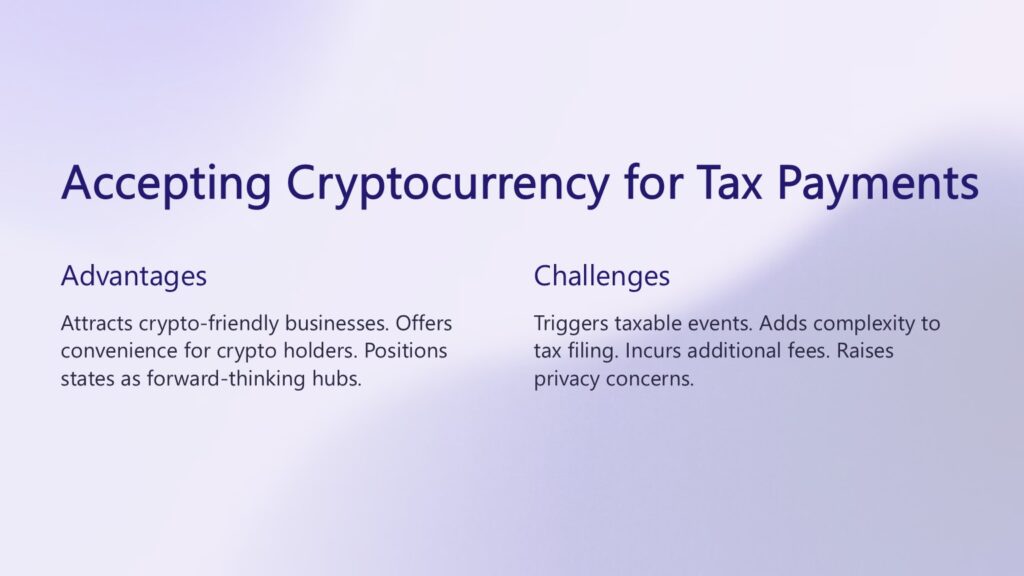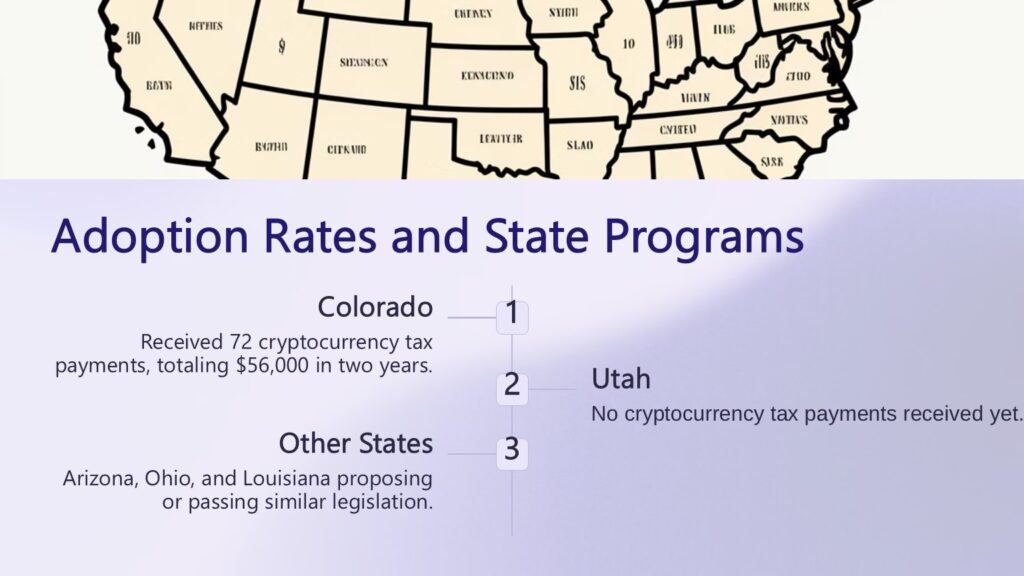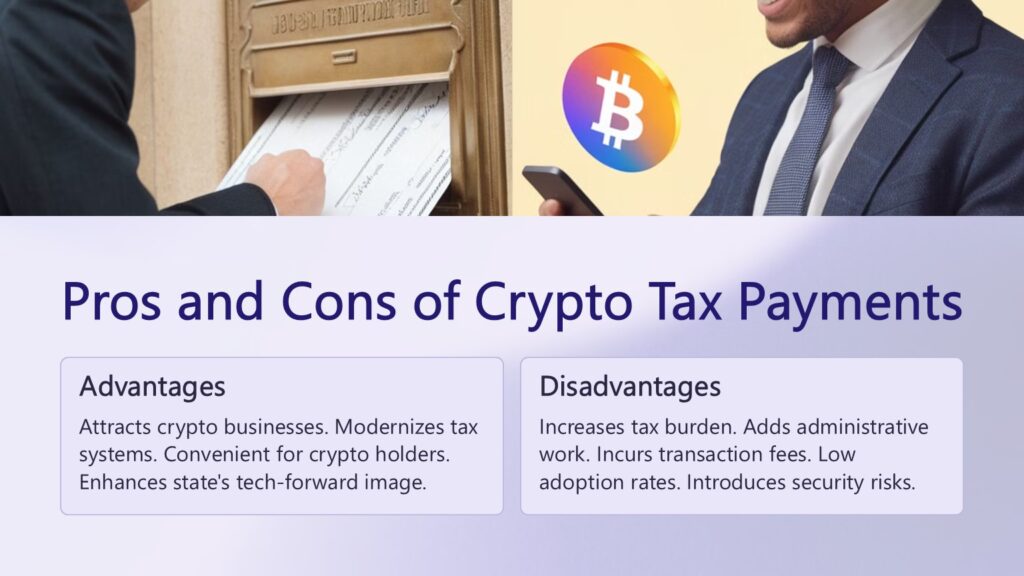1. Tax Payment Using Cryptocurrency

While Japan has yet to embrace this system, several U.S. states have introduced systems enabling taxpayers to pay their taxes using cryptocurrency. This move is both intriguing and innovative, potentially attracting crypto-friendly businesses and establishing these states as forward-thinking hubs for digital currencies. Additionally, it offers a unique convenience to taxpayers with substantial cryptocurrencies, letting them pay their taxes directly in cryptocurrency without converting to fiat, saving time and possibly avoiding exchange fees. In any case, having more payment options might be beneficial for individual taxpayers.
However, paying taxes with cryptocurrency comes with complications. For one, it can trigger a taxable event, requiring taxpayers to report any capital gains or losses on the cryptocurrency they use. This adds layers of complexity to the tax filing process and could lead to increased tax liabilities.
Moreover, when local governments rely on third-party payment processors like PayPal to convert cryptocurrency into fiat currency and pass those processing fees onto taxpayers, or if blockchain transaction fees are incurred, paying taxes with cryptocurrency may become less appealing compared to other payment methods. These additional costs create economic disincentives for taxpayers.
There are also concerns regarding the security and management of cryptocurrency wallets by local governments. On the taxpayer’s side, many are hesitant to share their wallet addresses due to privacy concerns, as this could potentially reveal their crypto balances and transaction history.
Even if the local government doesn’t directly handle the taxpayer’s wallet addresses used for tax payments—such as those made through PayPal or BitPay —this issue remains if the government can easily investigate it
2. “Crypto Tax Payments Get Few Takers as More States Eye Programs” (Bloomberg Tax, Oct. 3, 2024)
So, the question remains: Are cryptocurrency users genuinely embracing this method of tax payment?

In his article, “Crypto Tax Payments Get Few Takers as More States Eye Programs” (Bloomberg Tax, Oct. 3, 2024), Michael J. Bologna examines the current landscape of U.S. states accepting cryptocurrency for tax payments, highlighting both the benefits and drawbacks.
In the two years since Colorado introduced the option, the state has received just 72 cryptocurrency tax payments, totaling approximately $56,000. This is a relatively modest figure, especially given the high value of cryptocurrencies like Bitcoin. Meanwhile, Utah, which also accepts cryptocurrency for tax payments, has yet to receive any such transactions. Despite the low adoption rate, other states, including Arizona, Ohio, and Louisiana, have proposed or passed similar legislation, hoping that accepting cryptocurrency will boost business innovation and make their states more attractive to tech-forward companies.
Critics, however, argue that these programs unnecessarily complicate the tax payment process. Since neither Colorado nor Utah recognizes cryptocurrency as legal tender, they rely on third-party services like PayPal to convert crypto into U.S. dollars, which adds transaction fees for taxpayers. These fees, coupled with the potential for capital gains taxes triggered by the sale of cryptocurrency, create additional burdens, making the system less appealing to taxpayers.
While legislators are pushing crypto-related bills, particularly around blockchain technology and consumer protection, the enthusiasm doesn’t seem to extend to taxes. The high transaction costs and limited adoption rates suggest that paying taxes with cryptocurrency is still far from gaining widespread traction.
Omri Marian, a professor of tax law at the University of California, Irvine School of Law, said “I just don’t understand why states want to do this other than the fact it may look ‘cool,’ ” , “It makes no policy sense. It’s an added collection cost to the state with no discernible benefit.”
3. Summary of the Article
At present, there are clear pros and cons to paying taxes with cryptocurrency. These disadvantages can also be seen as issues that need to be addressed for the system to succeed.

Advantages of Paying Taxes in Cryptocurrency:
- Attracting Crypto Businesses: States accepting crypto may position themselves as attractive destinations for businesses in the digital currency space.
- Technological Modernization: Adopting crypto tax payments can help modernize state tax systems.
- Convenience for Crypto Holders: Taxpayers with large crypto holdings can avoid the need to convert their assets to fiat currency.
- Public Perception and Innovation: Such programs can enhance the perception of a state as being tech-forward and innovative.
Disadvantages of Paying Taxes in Cryptocurrency:
- Increased Tax and Administrative Burden: When selling cryptocurrency to pay taxes, capital gains may arise, potentially increasing the taxpayer’s tax burden (though if capital losses occur, the tax burden may decrease). Additionally, calculating and reporting these capital gains or losses involves significant administrative work.
- Transaction Fees: Fees are incurred when using payment services or processing transactions on blockchains.
- Low Adoption Rates: The cost of maintaining the system may not justify its low usage.
- Operational and Security Risks: Managing crypto wallets introduces technical and security challenges for local governments.

In conclusion, while the concept of paying taxes with cryptocurrency may offer certain advantages, it also presents significant challenges that need to be carefully considered before wider adoption becomes feasible.


